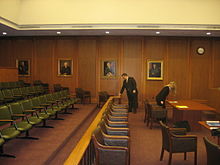- Continuing legal education
-
Continuing legal education (CLE; also known as MCLE (mandatory or minimum continuing legal education)) is professional education of lawyers that takes place after their initial admission to the bar. In many states in the United States, CLE participation is required of attorneys to maintain their license to practice law. CLE requirements exist in many other jurisdictions, such as in British Columbia, Canada. Some jurisdictions, such as the District of Columbia and Israel recommend but do not require lawyers to participate in CLE.
Contents
United States
Legal education in the United States 
Stages Pre-law
Law school
Trial practice
Legal clinic
Juris Doctor
Master of Laws
Doctor of LawsExams LSAT
Bar examination
Continuing legal educationOrganizations Law School Admission Council
American Bar Association
Practising Law InstituteIn the United States, CLE accreditation is given on a state-by-state basis. There is no nationwide accreditation since CLE programs are administered by the state supreme courts through special CLE Commissions or Boards.[1]
CLE credit usually have set hour requirements over a period of years, sometimes with specific hour requirements for special topics including, but not limited to, ethics, diversity training, elimination of bias, professional responsibility, basic skills, substance abuse, professional, prevention of malpractice, attorney-client disputes and other topics. Credit towards fulfilling CLE requirements is obtained by attending classes, courses, seminars and self-study.
CLE activities are offered throughout the year by state bar associations, national legal organizations such as the American Bar Association, Federal Bar Association, law schools, and many other legal associations and groups such as non-profit CLE providers Practising Law Institute (PLI), American Law Institute ALI-ABA Continuing Professional Education (ALI-ABA), The Center for American and International Law (CAIL), and The Institute of American & Talmudic Law (IAT Law), as well as other private, for-profit enterprises, such as CLECenter.com, Continuing Legal Accreditation Seminar Services (CLASS, LLC), CLE-NJ, National Academy of CLE and West LegalEdCenter. Activities are usually open to all lawyers (and sometimes non-lawyers), but organizations often offer discounts to their own members. A recent trend is toward the provision and promotion of free CLE programs.
Uniquely, Kentucky allows all licensed attorneys in the state to complete their annual CLE requirement without a registration fee through a two-day program known as Kentucky Law Update, offered annually in at least seven locations throughout the state.[2]
In recent years, many states allow CLE activities to be taken on-line as part of distance education courses or by listening to audio downloads. Often, a portion of CLE requirements may be satisfied through reading and other self-study as well. CLE activities are usually taught by attorneys and cover legal theory as well as practical experiences in legal practice. Classroom materials can be extensive and may represent the most current and advanced thinking available on a particular legal subject. Competency testing is usually not required as part of CLE.
Experienced attorneys may receive credit for speaking or teaching at an accredited CLE program;[3] for moderating or participating in a panel presentation at an accredited CLE activity; for teaching law courses at an American Bar Association-accredited law school; for preparing students for and judging law competitions, mock trials and moot court arguments, including those at the high school or college level; for published legal research-based writing; and for providing pro bono legal services.
Canada
In Canada, rules vary from province to province. For example, Alberta has a mandatory Continuing Professional Development (CPD) program, requiring preparation of annual CPD plans.[4] Lawyers develop their plans and declare to the Law Society of Alberta on an annual basis that these are complete. The Legal Education Society of Alberta[5] provides tools to facilitate compliance with these requirements.
The Philippines
Continuing legal education required of members of the Integrated Bar of the Philippines (IBP) to ensure that throughout their career, they keep abreast with law and jurisprudence, maintain the ethics of the profession and enhance the standards of the practice of law (Rule 1, Bar Matter No. 850 – Supreme Court of the Philippines)
See also
- Bar Professional Training Course
- National Judges College (China)
- National Judicial Academy (India)
References
- ^ ABAnet MCLE Questions
- ^ "About KLU (Kentucky Law Update)". Kentucky Bar Association. http://kybar.org/Default.aspx?tabid=190. Retrieved 2008-04-27.
- ^ [1]
- ^ "CPD Alberta". https://www.cpdalberta.ca/. Retrieved 2009-05-08.
- ^ [2]
External links
- ALI-ABA, the American Law Institute - American Bar Association CLE
- CLE Requirements By State
- ABA-CLE, the American Bar Association Center for CLE
- ABA Model Rule for Minimum Continuing Legal Education with Comments
- The Center for American and International Law
- CLEreg, the Continuing Legal Education Regulators Association
- Practising Law Institute
- List of online CLE bookstores from ACLEA.org
- 4freeCLE - Free Continuing Legal Education Aggregator
- Detailed State CLE Rules
Categories:- United States law
- Legal education
- Continuing education
Wikimedia Foundation. 2010.
